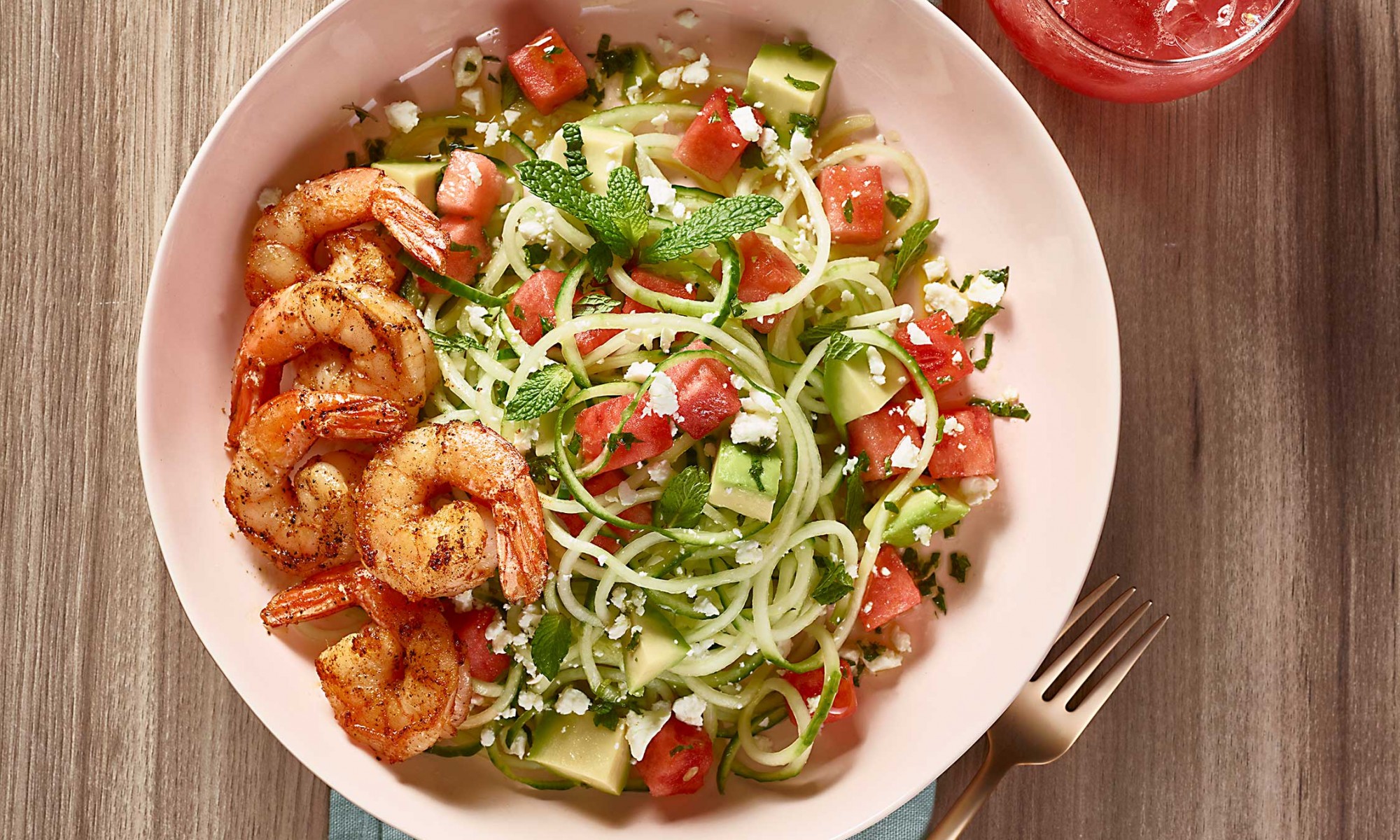
Did you know that March is National Nutrition Month®? It’s true! National Nutrition Month is sponsored by the Academy of Nutrition and Dietetics and started almost 50 years ago. What better way to celebrate, than with a beloved watermelon, which provides us with unique nutrients and health benefits?
Watermelon Contains Many Nutrients and Beneficial Plant Compounds
Watermelon is packed with nutrient-dense minerals, fiber (4% DV in 2 cups), and antioxidant-rich phytonutrients, like beta carotene (0.9 mg per 2-cup serving) and lycopene. It contains higher levels of lycopene than any other fresh fruit or vegetable (12.7 mg per 2-cup serving) and is considered a Lycopene Leader.[1] Watermelon is an excellent source of Vitamin C (25% DV) and a source of Vitamin A (8% DV).1,[2] Vitamin C has a key role in immune function, helping to prevent and/or treat numerous health conditions. Vitamin A is important for optimal eye health. Watermelon also provides us with vitamin B6 (8% DV) and potassium (6% DV).1,2 Vitamin B6 is used in protein metabolism and plays a role in cognitive development and immune function as well.[4]. Potassium is a mineral necessary for water balance and is found inside of every cell.2
Watermelon Can Help You Stay Hydrated
At 92% water, watermelon is an excellent and delicious way to help hydrate your body.[5] Proper hydration is one of the most important aspects of health. We need water in order for our bodies to function properly. Water carries nutrients and oxygen to cells, moves waste products out of our body, and helps lubricate joints allowing us to exercise and play![6] Eat watermelon all-year-round to up your hydration!
Melon Potential for Reducing Risk of Certain Chronic Diseases
Research suggests that people who eat more vegetables and fruits as part of an overall healthy diet are likely to have a reduced risk of some chronic diseases, including heart disease and some cancers.[7] Watermelon is a wonderful addition to a heart-healthy diet and is proudly American Heart Association Heart-Check Certified. It is cholesterol-free, fat-free, sodium-free, and only 80 calories per 2 cups.2 It also contains an antioxidant-rich phytonutrient, Lycopene (12.7 mg per 2-cup serving). Lycopene has been studied for its potential role in reducing blood pressure (in those with prehypertension or hypertension) and reducing the risk of prostate cancer. Further research is needed with a larger sample size and longer duration in order to fully determine the clinical implications.
Watermelon Is Good for Skin
Vitamin A and Vitamin C are both found in watermelon and these nutrients play a pivotal role in maintaining healthy skin. Vitamin C (25% DV) may help your body make collagen, a protein that strengthens your skin while creating elasticity. Vitamin A (8%) is important for healthy skin since it helps repair skin cells.[8] Without enough vitamin A, skin can appear dry and flaky. Although more research and clinical trials are needed, systematic reviews and meta-analyses link lycopene to a possible role in maintaining healthy skin through sun protection.[9],[10] Try rejuvenating your skin and get glowing with an all-natural, DIY watermelon remedy.
Watermelon Can Improve Digestion
Watermelon contains both water and fiber (4% DV). These two compounds are important for healthy digestion. Fiber increases bulk in the digestive tract and may keep the frequency of bowel movements regular. Water keeps the food in your digestive tract moving so that nutrients can be properly absorbed and fully digested. Eating fruits and vegetables that contain both fiber and water, including watermelon, can be very helpful for promoting normal bowel movements.
Nutritious and Delicious Watermelon Recipes!
National Nutrition Month is the perfect time to up your nutrition game by creating healthy eating habits. Reap the unique health benefits of watermelon this month by incorporating these recipes into your meal rotations!
- Sweet Watermelon Pizza The hardest part of making this sweet pizza is deciding what toppings to use. Healthy enough for breakfast and sweet enough for dessert, this watermelon pizza will quickly make its way into your weekly meal rotation.
- Watermelon “BLT” –The classic BLT stacked sandwich is “rewritten” with bacon, lettuce and a secret ingredient – watermelon!
- Spiralized Cucumber and Watermelon Salad – Say goodbye to boring dinners with this vibrant and refreshing spiralized salad.
###
1 Naz A, Butt MS, Sultan MT, Qayyum MM, Niaz RS. Watermelon lycopene and allied health claims. EXCLI J. 2014;13:650-60.
[2] USDA Food Composition Database. https://ndb.nal.usda.gov/ndb/search/list?home=true
[3] National Institutes of Health. Vitamin C: Fact Sheet for Health Professionals. https://ods.od.nih.gov/factsheets/VitaminC-HealthProfessional/
[4] National Institutes of Health. Vitamin B6: Fact Sheet for Health Professionals. https://ods.od.nih.gov/factsheets/VitaminB6-HealthProfessional/
[6] Harvard Health Publishing. https://www.health.harvard.edu/staying-healthy/the-importance-of-staying-hydrated.
[7] U.S. Department of Agriculture: ChooseMyPlate. https://www.choosemyplate.gov/eathealthy/vegetables/vegetables-nutrients-health.
[8] National Institute of Health: MedlinePlus. Vitamin A. https://medlineplus.gov/vitamina.html.
[9] Stahl W, Sies H. β-Carotene and other carotenoids in protection from sunlight. Am J Clin Nutr 2012; 96 (5): 1179S-84S. DOI: 10.3945/ajcn.112.034819.
[10] Nwanodi O. Skin Protective Nutraceuticals: The Current Evidence in Brief. Healthcare. 2018; 6(2):40.
[11] National Institute of Health. Rough Up Your Diet: Fit More Fiber Into Your Day. https://newsinhealth.nih.gov/special-issues/eating/rough-up-your-diet.

Comments
Thanks aloft for the info. Today, the 3rd of August is National Watermelon Day too ❤️
Hi friends! Just a gentle reminder that you are enough just as you are. You’re deserving of love, happiness, and fulfillment.